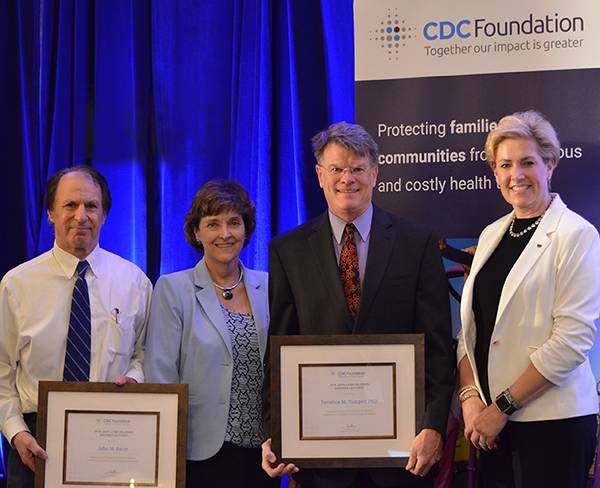You are here
The Hilleman Endowed Lectureship Focuses on the 1918 Influenza Pandemic
This past week I had the pleasure to support and attend the Jeryl Lynn Hilleman/Merck Company Foundation Endowed Lectureship at the 48th National Immunization Conference in Atlanta. This year’s lectures were focused on an event that altered the history of the nation and world, the 1918 influenza epidemic, which is estimated to have caused the deaths of more than 50 million worldwide.
With this year marking the 100th anniversary of the 1918 Influenza Pandemic, the Hilleman Lecture selection committee invited experts to speak about the pandemic, the progress that has been made from a medical perspective and to illuminate on the continued relevance of the pandemic.
Dr. Judy Monroe, the Foundation’s president and CEO, led off the evening’s remarks followed by Kathleen Taylor, RPh, director, U.S. Vaccines, Medical Affairs at Merck & Co., Inc., and Dr. Nancy Messonnier (CAPT, USPHS), director of the National Center for Immunization and Respiratory Diseases at CDC.
The evening’s first lecturer was best-selling author John M. Barry, author of the 2004 book The Great Influenza: The Epic Story of the Deadliest Plague in History. To paint a picture of the magnitude of the pandemic, Barry explained “If you took the number of children aged one to four who died in 1918 due to influenza, it would equal the all-cause mortality for that age group of a 23 year-long period today.”
He continued, “There were numerous reports in big cities and rural areas where people actually starved to death, not because of a lack of food, but because healthy people were afraid to bring food to those who were sick.” Throughout his discussion, Barry emphasized the importance of effective risk communication as well as the negative implications from poor communication.
The second lecturer was Dr. Terrence M. Tumpey, chief of the Immunology and Pathogenesis Branch of the Centers for Disease Control and Prevention’s (CDC) Influenza Division. Dr. Tumpey’s lecture focused primarily on research that isolated the key biomolecular aspects of the 1918 flu virus that made it so lethal. His story began in 1918 in the small town of Brevig, Alaska, where 72 out of the 80 residents died as a result of the pandemic and were placed in a mass grave.
In his lecture, Dr. Tumpey spoke about Johan Hultin, PhD, who in 1951 came up with the hypothetical possibility that the virus could still be preserved in the tissues of the deceased in Brevig due to permafrost. Although his initial tests failed, 46 years later he and Dr. Tumpey worked together and decided to try again. Through an extensive extraction and sequencing process, they were finally able to identify the genetic makeup of the 1918 flu virus.
Wanting to explore the genetic makeup further, Dr. Tumpey pursued the specific polymerase proteins that made the virus so virulent and transmissible. He explained that one of their final goals in 2009 was to show whether the current seasonal influenza virus provided protection against the 1918 virus. After extensive testing with the standard vaccines against the 1918 virus, they found that the vaccine protected against severe disease. The 1918 virus sequence went on to be utilized in hundreds of published studies.
The Jeryl Lynn Hilleman/Merck Company Foundation Endowed Lectureship was created in 1996 with support from The Merck Company Foundation to commemorate the 50th anniversary of CDC and the 25th anniversary of the first combined measles-mumps-rubella vaccine. The late Dr. Maurice Hilleman is widely regarded as the world’s most productive and impactful vaccine developer. The Hilleman Endowed Lecture is named for Dr. Hilleman’s daughter, Jeryl Lynn. When Jeryl Lynn contracted mumps in 1963, Dr. Hilleman isolated the virus, leading to the development of the mumps vaccine and subsequently to the first effective vaccine for measles, mumps and rubella. The Hilleman Endowed Lectureship now honors lecturers who have contributed significantly to the elimination of any pediatric disease and immunization overall.
In her closing remarks, Dr. Monroe stated poignantly that, “we like to think pandemics are a thing of the past—a footnote in history—but we know that is not true.”
At the CDC Foundation, we are proud to support the Jeryl Lynn Hilleman Endowed Lectureship. We are also grateful for the support of The Merck Company Foundation and Merck & Co., Inc., without whom this event would not be possible. If you would like to support the Jeryl Lynn Hilleman Endowed Lectureship or the more than 300 CDC-led programs in the United States and in more than 130 countries that the CDC Foundation manages, please visit www.cdcfoundation.org/give or contact Elizabeth Patrick, donor relations officer for the CDC Foundation, at 404-523-1873 or by email at epatrick@cdcfoundation.org.

